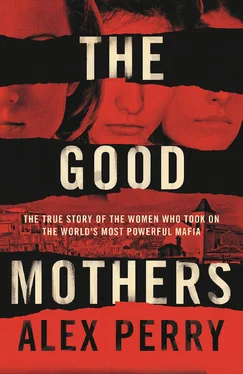At least Carlo was making an effort not to gloat, thought Lea. He had a friend drop round 100 euros for the train tickets to Milan. When Lea and Denise pulled into the city’s central station, Mussolini’s opulent glass-and-marble monument to northern order and power, Carlo himself picked them up in a black Audi and took them to the Hotel Losanna, a cosy backstreet place a block from the Corso Sempione, Milan’s Champs-Elysées, and a short walk from their old family apartment on Viale Montello. And for the next four days, Carlo refused even to discuss the past. He didn’t mention the ’Ndrangheta or how Lea had broken omertà or the way she almost destroyed everything for which he and his brothers had worked. Instead, Denise said the three of them enjoyed a ‘quiet and pleasant’ mini-vacation, the kind of family holiday they’d never had. Milan’s Ferrari showrooms and Armani stores were a million miles from the goat pastures of Calabria, and Carlo seemed happy for his wife and daughter to enjoy it. With his coat tugged around his shoulders in the Milanese style, and Lea and Denise in jeans and thick down jackets, the three of them wandered the canals and the polished stone piazzas, eating pizza and cannoli and window-shopping in the nineteenth-century galleria across from Milan’s flamboyant Gothic Duomo. Carlo paid for everything: clothes for Denise, dinners for the three of them, coffees and gelatos . Carlo even fixed it for the two women to get their eyebrows done at a beauty salon owned by his friend Massimo. Another time, when Lea was out of hash, Carlo summoned a cousin, Carmine Venturino, and made sure she didn’t pay.
It wasn’t perfect, of course. Denise was busy nurturing a teenage addiction to cigarettes and an aversion to heavy Italian food. Carlo, seeing his wife and daughter for only the second time in thirteen years and noticing how alike they were, couldn’t help be transported back to the day, nineteen years earlier, when sixteen-year-old Lea had eloped with him to Milan. Meanwhile Lea was struggling to hold her nerve. She’d asked Carlo not to tell anyone she was in Milan but already he’d gone ahead and introduced her to Massimo and Carmine, and Carmine, for one, seemed more than just a friend to Carlo. She also had the recurrent feeling that they were being followed.
Lea found herself turning to an old habit. Denise’s mother had long needed a joint or two just to get to sleep at night and, as the butts Denise found in their room attested, she was now also smoking steadily through the day. Sleep and peace were good, of course, and a real rarity for Lea. But you had to wonder at the wisdom of getting stoned around Carlo, a mafioso who had spent the last thirteen years chasing her across Italy trying to kill her.
Still, the trip went better than Lea might have feared. Initially, she had asked Denise to stay with her when Carlo was around because, said Denise, ‘if I was there, nothing was going to happen to her.’ Soon, however, Lea felt safe enough to be left alone with her husband. On the night of 23 November, Denise went to bed early and Lea and Carlo ate out alone. If the years had tightened Lea’s nerves, time seemed to have relaxed Carlo. He was now a barrel of a man, with thick ears, a close-shaven head and a boxer’s nose, but his manner was gentle and attentive. When Lea mentioned Denise’s plan to go to Milan University, Carlo offered to keep an eye on her. When Carlo volunteered that he’d set aside €200,000 for his daughter and Lea scolded him for the tens of thousands he’d spent trying to track them down – ‘and for no reason, because you always arrived too late!’ – Carlo, unusually, took the slight well. After he paid the bill, Carlo took Lea on a drive through the city, the pair of them gliding through the empty streets in silence, just taking in the sights and each other’s company. So distracted was Carlo that he ran a red light, delighting Lea, who was treated to the sight of the big mafioso trying to wriggle out of a ticket.
Watching them together in those days – Lea smoking and laughing, Carlo rubbing his bruiser’s neck and letting a smile soften his frown – Denise said you could see they had been in love once. You might even believe it would work out for the three of them. The three ‘ate together’ as a family, Denise said later. Carlo was showing them how ‘caring and kind’ he was. And there was no denying Lea still had it. Even without a cent in her pocket, and despite everything that had happened, her mother was still a rare and beautiful thing, a Calabrian forest sprite with the same pure spirit that had marked her out from every other girl in Pagliarelle all those years ago. Carlo, Denise felt sure, had to be falling for Lea again. ‘I had absolutely no bad thoughts about my father,’ she said.
Lea and Denise’s last day in Milan was 24 November 2009. The two women were planning to take the 11.30 p.m. sleeper back to Calabria. In their room at the Losanna, Lea and Denise packed. To help take the bags to the station, Carlo brought round a big grey Chrysler he had borrowed from a friend.
As he loaded their cases, Carlo asked Denise whether she’d like to eat that evening with her cousins: Uncle Giuseppe, Aunt Renata and their two boys, eighteen-year-old Domenico and Andrea, fifteen. Denise should grab the chance to spend time with her family, said Carlo. A night alone would also give her parents the chance to discuss a few last things.
Denise agreed. She and Lea then walked into town to do some final shopping. It was an overcast day, only just above freezing, and a dull chill echoed off the granite buildings. CCTV later showed Lea in a black jacket with its furry collar turned in and Denise in a thick white jacket with her hood up and a black backpack over the top. Mother and daughter wandered around the arcades, warming themselves in cafés and grabbing lunch at a McDonald’s, just happy to be out together in the city and, for once, not looking over their shoulders.
An hour after dark, just before 6 p.m., Denise called Carlo. She and Lea were near the Arch of Peace in Sempione Park, not far from the hotel, she said. A few minutes later, Carlo arrived in the Chrysler, flicked on his hazard lights and reminded Denise through the driver’s window that she was expected for dinner with her cousins. Lea, who had already got in the car, didn’t want to go: even if she was getting on better with Carlo, she wanted nothing to do with his family. Carlo suggested he drop off Denise, then return to take Lea out for a quiet dinner. After everyone had eaten, Carlo and Lea would pick Denise up again and all three of them would head over to the station. The women agreed. ‘See you at the station, mama ,’ said Denise to Lea as she jumped into the car. ‘Later,’ replied Lea, getting out. ‘I’m going to have a drink.’
Carlo drove Denise to No. 6 Viale Montello on the edge of Milan’s Chinatown. A large, grubby six-storey walk-up of more than a hundred apartments arranged around a drab internal courtyard, No. 6 Viale Montello had once belonged to the Maggiore Ospedale, one of Europe’s first public hospitals when it opened in 1456. But the place had fallen into disrepair and was later abandoned, and in the 1980s the ’Ndrangheta from Pagliarelle had taken it over as a live-in hub for their heroin and cocaine business. The ground floor was now filled with half a dozen cheap Chinese stores – groceries, laundries, tabacs – whose metal shutters were decorated with extravagant graffiti. Most of the apartments were home to immigrants from China, Romania, Albania, Poland, Eritrea and Nigeria, tenants whose own uncertain legal status ensured they were no friends of the law. The rest was given over to around a dozen mafia families. Carlo, Lea and Denise had lived in one apartment in the early 1990s. Carlo’s elder brothers Vito and Giuseppe were still installed in others with their wives and children. It was to these rooms that tons of cocaine and heroin were transported every year before being repackaged and shipped north into Europe.
Читать дальше












